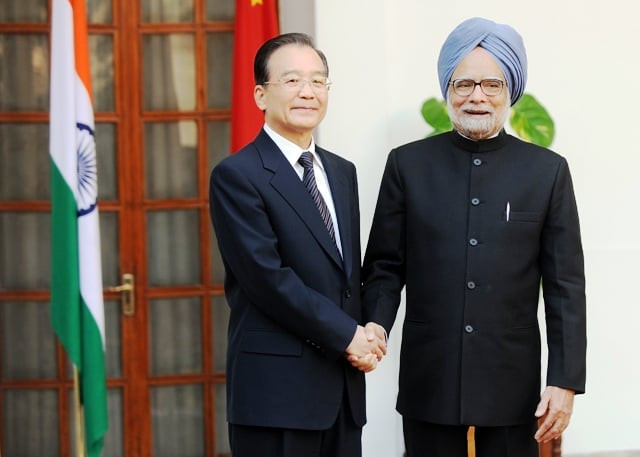China PM on India charm offensive, offers trade boost
India, China agree on ambitious target of $100 billion in trade between the rising Asian powers by 2015.

Relations between the Asian giants are tense, despite the booming trade relationship between them. Nearly 40 years after they fought a war, there are still rifts over disputed borders, and suspicion in New Delhi over China's regional ambitions and its close ties with Pakistan.
But both Wen and Indian Prime Minister Manmohan Singh exchanged vows of amity and goodwill ahead of brief bilateral talks in the capital, appearing to brush under the carpet a series of differences that have long dogged relations.
"I believe with our joint efforts, through the visit, we'll be able to raise our friendship and cooperation to a high level in the new century," said Wen, standing alongside Singh at the Indian presidential palace after a formal red-carpet welcome ceremony.
"With the joint efforts of the prime minister and I, we'll be able to reach (an) important strategic consensus during my visit and the visit will yield important outcomes."
Wen's visit, the first by a Chinese premier to India in five years, has looked carefully choreographed to improve ties between two countries which, between them, are home to more than a third of the world's population.
Arriving with more than 300 business leaders on Wednesday, Wen said that India and China were not rivals and there was room in the world for both powers to develop.
"There is a trust deficit, a trade deficit but certainly not a charm deficit," said broadcaster CNN IBN Deputy Editor Sagarika Ghose.
Singh responded in kind to Wen's effusive words before they went into a meeting behind closed doors: "A strong partnership between India and China will contribute to long-term, peace, stability, prosperity and development in Asia and the world."
Boosting trade
The two sides said they were aiming to raise bilateral trade to $100 billion by 2015 from $60 billion in 2010, partly driven by greater access for Indian firms to Chinese markets.
"The two sides agreed to take measure to promote greater Indian exports to China with a view to reduce India's trade deficit," the joint statement said.
India and China are the world's fastest-growing major economies. But India fears China wants to curtail its rise as a global power, and is concerned about Beijing's close security ties with Pakistan where Wen arrives on Friday on the second part of his trip.
"Terror of any kind... cannot be an instrument of state policy. I think that is the message we will convey to Prime Minister Jiabao and hopefully he will convey that to Pakistan," Indian Foreign Minister S.M. Krishna told CNN IBN.
The joint statement outlined Beijing's support for United Nations Security Council Resolution 1267, which calls for sanctions against the Lakshar-e-Taiba militant group that New Delhi blames for the attack and accuses Pakistan of harbouring.
India also fears China wants to restrict its global reach by possibly opposing its bid for a permanent U.N. Security Council seat or encircling the Indian Ocean region with massive projects from Pakistan to Myanmar.
China reiterated its support for India's aspirations to play a greater role in the Security Council, but it stopped short of expressing full backing for India.
Charm offensive
Long wary of Washington's influence in South Asia, Beijing's overtures toward New Delhi come just a little over a month after U.S. President Barack Obama's trip to India, during which he endorsed India's long-held demand for a permanent seat.
Wen's avuncular style contrasts sharply with that of Singh, who is seen as shy and lacking charisma. Singh is also engulfed in what may be India's biggest corruption scandal, threatening the stability of the Congress party-led coalition government.
Wen announced on Wednesday that Chinese companies would sign deals with Indian firms worth more than $16 billion ranging from power equipment to telecoms gear, underscoring business was driving the relationship, for now.
Chinese banks will provide the bulk of lending for these deals.
Although both India and China have said they are exploring a possible free-trade agreement, no real progress is expected on that front as there is some scepticism in New Delhi that Beijing may only want to dump cheap manufactured goods on India's booming $1.3 trillion economy.
China is now India's largest trade partner and two-way trade is expected to reach $60 billion in 2010/11 compared with a target of $40 billion. Trade was $13.6 billion in 2004/05 and $3 billion in 2001/02, illustrating the phenomenal growth rate.
Still, total investment by China in India is small, amounting to only $221 million in 2009, representing about 0.1 percent of China's total outward foreign direct investment in that year. That figure is seven times less than what China has invested in Pakistan, according to official data.
While the two are often lumped together as emerging world powers, China's GDP is four times bigger than India's and its infrastructure outshines India's dilapidated roads and ports, a factor that makes New Delhi wary of Beijing's growing might.





1733130350-0/Untitled-design-(76)1733130350-0-208x130.webp)













COMMENTS
Comments are moderated and generally will be posted if they are on-topic and not abusive.
For more information, please see our Comments FAQ